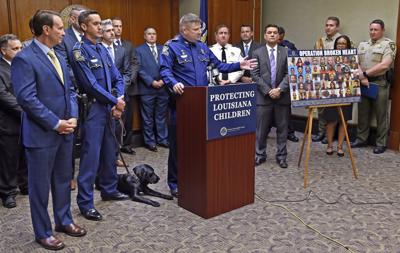In 2017, Attorney General Jeff Landry formed a task force of commissioned law enforcement officers and deployed them to New Orleans, vowing to have them patrol there until they were able to “root out all crime” in the state’s largest city.
A few months later, a federal judge and city attorneys had concluded the attorney general didn’t have the power to make arrests in the city, and Landry had quietly disbanded the small task force amid a public fight with then-Mayor Mitch Landrieu.
The saga illustrated an inconvenient truth for a host of candidates running for governor and attorney general this year: the attorney general doesn’t hold great powers in fighting most of the types of crime that citizens fear.
The attorney general is primarily responsible for representing state agencies in civil suits and offering advisory opinions on state legal questions. Its criminal oversight is mostly limited to niche areas like Medicaid fraud, cyber crimes and, to a limited extent, public corruption.
The state constitution in Louisiana gives district attorneys broad control over criminal cases in their jurisdictions. Generally, the attorney general is only called to prosecute when a district attorney recuses from a case.
“The AG’s office’s principal job is defending the state and state departments and agencies in rather mundane and boring litigation,” said Dane Ciolino, a criminal defense lawyer and a law professor at Loyola University. “A small percentage of the work of that office deals with criminal prosecutions, which are constitutionally delegated to the DAs and judicial districts across the state.”
That hasn’t stopped candidates for governor or attorney general from promoting the idea that the state’s attorney general is the state’s top cop, responsible for leading a new tough-on-crime era sought by Republicans.
In an attack ad launched this summer, a super PAC supporting Republican Stephen Waguespack for governor accused Landry of failing on crime.
“As Louisiana’s top law enforcement official, Jeff Landry has failed us,” the narrator said. “Murder. Rape. Carjackings. Under Landry’s watch, Louisiana is now the most dangerous state in America.”
Landry himself has said he built his campaign around crime. He has sought to rebrand the Attorney General’s Office as a leader in the fight against crime, renaming its investigative arm the Louisiana Bureau of Investigation upon taking office. In his first ad in the governor's race, Landry touted his background as a police officer and attorney general and vowed to crack down on crime.
But Landry agrees that his crime-fighting efforts were restricted by the powers of the office, saying in an interview Friday that his office “ran up against constitutional and resource limitations.”
“It was a great exercise in understanding the difference between what we could do as attorney general and what we could do as governor,” he said.
He noted that the governor is in charge of State Police, which has much more manpower than the AG’s office. He also said he is open to changing the state constitution to address the powers of judges and district attorneys.
But Landry declined to offer specifics on what he would do as governor, saying he doesn’t have the “pieces of the puzzle yet.” But he has hammered prosecutors in New Orleans and Shreveport, accusing them of being too lenient.
Landry noted that governors in other states — notably, Florida’s Ron DeSantis — have “removed prosecutors for failing to do their jobs,” but said he would first speak to the state’s DAs and legislators.
Landry said his effort to help patrol New Orleans failed because a federal judge “basically wanted to throw us in jail.” U.S. District Judge Susie Morgan, who oversees the consent decree between the Justice Department and the city’s police force, said at the time that Landry had limited ability to investigate crime, but “doesn’t have the ability to make statewide arrests for violations of state law.” Landry has fought to end the consent decree, which began in 2013 after a blistering federal investigation found the police department was rife with misconduct.
Both leading Republican candidates for attorney general are hammering on the crime issue as well.
Republican state Rep. John Stefanski has touted his bill to dramatically enhance penalties for dealing fentanyl in his campaign.
Stefanski said in a statement he understands the attorney general’s office has traditionally been mostly focused on civil issues. But he said if elected, he plans to shift his focus toward criminal issues by offering up investigators and prosecutors to DAs and “expand and fully utilize the investigators and prosecutors in the office.” He said he can work with his colleagues in the Legislature to change the laws to better fight crime if needed.
Liz Murrill, Landry’s top deputy, launched a TV ad that touts her role in “keeping murderers and pedophiles behind bars” in over 200 cases; that refers mostly to post-conviction appeals, as well as some instances where DAs recused themselves. She also vowed to fight human traffickers and drug cartels “at our border” as attorney general.
Murrill declined to comment for this story. But during candidate qualifying this summer, she disputed the idea that the attorney general doesn’t have a significant role in fighting crime. She said taking recusals is a “very important role.” When asked why the office hasn’t done more to fight crime, she suggested a lack of “resources” is the issue. Murrill serves as Landry’s top deputy.

